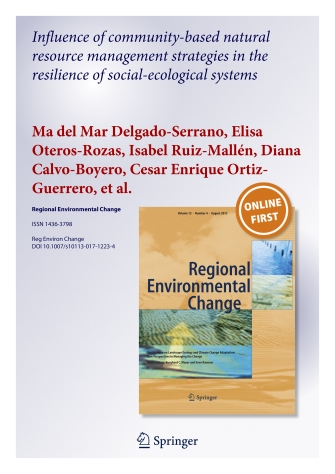Delgado-Serrano M.M., Oteros-Rozas E., Calvo-Boyero, D., Ortíz Guerrero, C., Escalante, R. and Corbera, E.
Regional Environmental Change. DOI: 10.1007/s10113-017-1223-4.
Resumen: Different social-ecological systems around the world are managed under community-based natural resource management (CBNRM) strategies. This paper analyses how CBNRM strategies influence the resilience of socialecological systems to the disturbances they face, drawing upon the experience of three Latin American cases (two in Mexico and one in Colombia). The cases differ in their CBNRM approach and in the time these governance systems have been in place. By using a mixed-method approach, we review the socio-ecological history and describe each CBNRM characteristics. We then assess their resilience to socioeconomic and environmental disturbances through a set of indicators. We found that CBNRM strategies influence positively and negatively resilience and that internal decisions might address important threats. On the positive side, the social-ecological systems with longer tradition of CBNRM and more local buy-in of commonly agreed objectives appear to be more resilient to environmental challenges. But, internal governance factors such as power imbalances, poor income distribution, and gender inequities linked to CBNRM undermine resilience and foster out migration. Finally, communities appear to have limited capacities to cope with external disturbances such as global drivers of change or national policies that negatively affect their social-ecological resilience.



